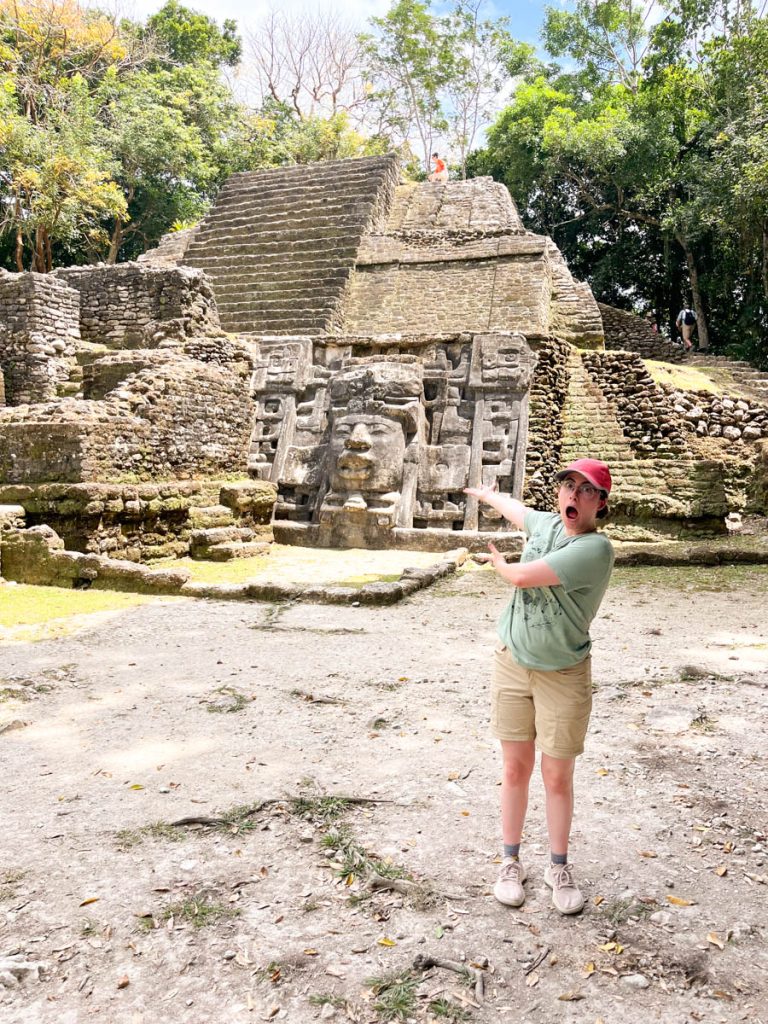Protection and Management of Tropical Ecosystems

The development and conservation challenges encountered in Belize present a compelling canvas upon which to study and learn about protection and management of tropical ecosystems. Learn how the major ecosystems of Belize, from rain forests to barrier reefs, are managed to both protect ecosystem integrity and meet human needs. The varied ecosystems encountered will provide an opportunity to understand what challenges are specific to certain ecosystems, and what challenges are ubiquitous to conservation across ecosystems.
During the program, students will explore conservation areas and coral reefs, encounter beautiful waterfalls, and hike through the rainforest. Enjoy a visit to the Belize Zoo at night, a Mayan village, a remote Smithsonian marine research station, the Rio Bravo Conservation Station, South Water Caye, and the Cockscomb Basin Wildlife Sanctuary and Jaguar Preserve.
Quick Information
| Application Due | Nov. 5, 2025 |
| Academic Date | March 21 – 29, 2026 |
| Credit Hours | 3 |
| Requirements | 2.5 MU GPA at time of application; Good academic standing. Open to all MU students. |
| Estimated cost | $4,021 (doesn’t include airfare) |
| Contact | Shanon Dickerson, Director of International Study Programs |
| Video | Watch Now |
Location
Belize is a small, English-speaking country in Central America home to significant tropical biodiversity. Belize has a wealth of natural resources, including tropical rain forests and the longest barrier reef in the Western Hemisphere. It is also a multi-cultural society with citizens from many different ethnic backgrounds.
Accommodation and Meals
Students will be housed in a variety of accommodations for the duration of the program. These include eco-lodges, cabanas, dormitories and hotels. Rooms will be shared, and the number of participants in a room will vary. In some cases, students will have only a few roommates in one location, but four or more in another location. Most bathrooms will be shared, community facilities. All housing costs are included in the program fee.
Most meals are included in the program fee; however, students will be responsible for some of their meal costs. As the program itinerary is finalized, an estimate for out-of-pocket meal expenses will be provided. Please note that the individual spending habits of each student will vary, so participants should use the estimate as a baseline and adjust according to their own eating habits.
Program Travel
International round-trip air travel will be arranged for the Belize group. This arranged flight generally departs from and returns to Lambert International Airport in St. Louis. Transportation from Columbia to Lambert will be the responsibility of the student. The faculty program leaders, Michael Byrne, Ph.D., and Alba Argerich, Ph.D., travel with the group flight to facilitate airport check-in and transfers. Because of the fluctuation in airline prices, the airfare estimate is listed separately below; however, once group reservations are made and the flight is finalized, the ticket cost will be added to the program fee and billed to participants’ MU accounts. All in-country program travel is organized by CAFNR and is included in the program fee.
Academics
Students are enrolled in three credits of AFNR 2190: International Agriculture, Food and Natural Resources (graded A/F) for the spring semester. Students should work with their advisors to determine how these credits will count toward their individual graduation plans.
Please be aware that there will be mandatory orientation classes prior to departure. Dates and times for the class meetings will be available shortly after the confirmed program participant list is finalized, generally around mid-November. Participants will be notified of the class meeting details via email.
Estimated Cost
MU Tuition (3 Credits; Spring Semester): Varies per student. See website for details.
| Non-refundable deposit: | $350 |
| Intl Center Fees: | $245 |
| Program Fees: | $3,426 |
| Total cost estimate without airfare: (includes accommodation and some meals) | $4,021 |
| Airfare estimate (does not include baggage fees): | $1,000-1,300 |
| Additional meals estimate | $250-300 |
| Additional misc. estimate: | $300-350 |
Special Considerations
The program travels to multiple locations. Sometimes a multi-hour bus ride through hilly terrain is required. You hike and walk on trails which can be uneven through jungles. Hikes in Cockscomb Basin can be strenuous because of the hilly terrain. You will likely carry backpacks and water. You will stay in relatively remote locations. You will spend time on small boats. There is a 30-minute boat ride to/from South Water Caye, and the program uses a boat to get to coral reef snorkeling locations while the program is there. Temperatures can be warm during the day, > 80 degrees. You will snorkel in the ocean on coral reefs while at South Water Caye. Given this is an ecology based class, you will spend a lot of time in the woods or in the ocean. As such, the potential to encounter many types of animals exists. Biting insects are likely to be the most frequently encountered. Tarantulas and scorpions are observed regularly. Snakes are present but not commonly encountered during the dry season when the program is held. Jaguars and mountain lions are present, but unlikely to be encountered. Sharks may be encountered on coral reefs. As Belize is a developing country, you are instructed not to pet any stray dogs encountered.